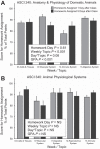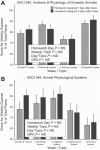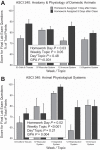Retrieval practice in the form of online homework improved information retention more when spaced 5 days rather than 1 day after class in two physiology courses
- PMID: 29676611
- PMCID: PMC6842879
- DOI: 10.1152/advan.00104.2017
Retrieval practice in the form of online homework improved information retention more when spaced 5 days rather than 1 day after class in two physiology courses
Abstract
Studies have shown that practicing temporally spaced retrieval of previously learned information via formal assessments increases student retention of the information. Our objective was to determine the impact of online homework administered as a first retrieval practice 1 or 5 days after introduction of physiology topics on long-term information retention. Students in two undergraduate courses, Anatomy and Physiology (ASCI 240) and Animal Physiological Systems (ASCI 340), were presented with information on a specific physiological system during each weekly laboratory and then completed an online homework assignment either 1 or 5 days later. Information retention was assessed via an in-class quiz the following week and by a comprehensive final exam at semester's end (4-13 wk later). Performance on homework assignments was generally similar between groups for both courses. Information retention at 1 wk did not differ due to timing of homework in either course. In both courses, however, students who received homework 5 days after class performed better on final exam questions relevant to that week's topic compared with their day 1 counterparts. These findings indicate that the longer period between introducing physiology information in class and assigning the first retrieval practice was more beneficial to long-term information retention than the shorter period, despite seemingly equivalent benefits in the shorter term. Since information is typically forgotten over time, we speculate that the longer interval necessitates greater retrieval effort in much the same way as built-in desirable difficulties, thus allowing for stronger conceptual connections and deeper comprehension.
Keywords: STEM education; information retention; spaced retrieval.
Conflict of interest statement
No conflicts of interest, financial or otherwise, are declared by the authors.
Figures





Similar articles
-
Homework questions designed to require higher-order cognitive skills in an undergraduate animal physiology course did not produce desirable difficulties, testing effects, or improvements in information retention.J Anim Sci. 2021 Sep 1;99(9):skab246. doi: 10.1093/jas/skab246. J Anim Sci. 2021. PMID: 34411241 Free PMC article.
-
Retrieval practice is an efficient method of enhancing the retention of anatomy and physiology information.Adv Physiol Educ. 2013 Jun;37(2):184-91. doi: 10.1152/advan.00174.2012. Adv Physiol Educ. 2013. PMID: 23728136
-
Interfacing virtual and face-to-face teaching methods in an undergraduate human physiology course for health professions students.Adv Physiol Educ. 2018 Sep 1;42(3):477-481. doi: 10.1152/advan.00097.2018. Adv Physiol Educ. 2018. PMID: 30035633
-
Changing undergraduate human anatomy and physiology laboratories: perspectives from a large-enrollment course.Adv Physiol Educ. 2016 Sep;40(3):388-92. doi: 10.1152/advan.00057.2016. Adv Physiol Educ. 2016. PMID: 27503898 Review.
-
Teaching Animal Physiology: a 12-year experience transitioning from a classical to interactive approach with continual assessment and computer alternatives.Adv Physiol Educ. 2017 Sep 1;41(3):405-414. doi: 10.1152/advan.00132.2016. Adv Physiol Educ. 2017. PMID: 28679579 Review.
Cited by
-
Homework questions designed to require higher-order cognitive skills in an undergraduate animal physiology course did not produce desirable difficulties, testing effects, or improvements in information retention.J Anim Sci. 2021 Sep 1;99(9):skab246. doi: 10.1093/jas/skab246. J Anim Sci. 2021. PMID: 34411241 Free PMC article.
-
A systematic review on trends in using Moodle for teaching and learning.Int J STEM Educ. 2022;9(1):9. doi: 10.1186/s40594-021-00323-x. Epub 2022 Jan 25. Int J STEM Educ. 2022. PMID: 35096513 Free PMC article. Review.
-
Systematic review of distributed practice and retrieval practice in health professions education.Adv Health Sci Educ Theory Pract. 2024 May;29(2):689-714. doi: 10.1007/s10459-023-10274-3. Epub 2023 Aug 24. Adv Health Sci Educ Theory Pract. 2024. PMID: 37615780 Free PMC article.
References
-
- Butler AC, Marsh EJ, Goode MK, Roediger HL. When additional multiple‐choice lures aid versus hinder later memory. Appl Cogn Psychol 20: 941–956, 2006. doi:10.1002/acp.1239. - DOI
-
- Butler AC, Roediger HL III. Testing improves long-term retention in a simulated classroom setting. Eur J Cogn Psychol 19: 514–527, 2007. doi:10.1080/09541440701326097. - DOI
MeSH terms
Grants and funding
LinkOut - more resources
Full Text Sources
Other Literature Sources

